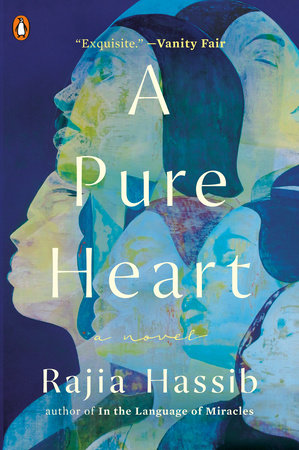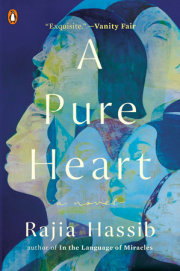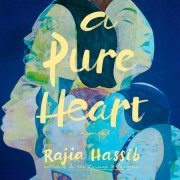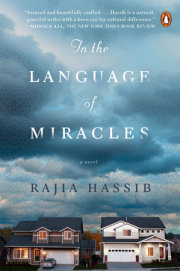1
On her last night in Egypt, Rose waits for her parents to fall asleep and then sneaks into her sister's bedroom. She sifts through the clothes strewn on the back of the chair, examines the contents of each desk drawer, picks through every nook of the armoire, then slides the mattress to the side and goes through the things stored under her sister's bed. Her own childhood bed, still standing in the room she used to share with her sister years ago, is covered with clothes, books, CDs, and papers, and Rose goes through those, too. The items on the bed seem to be some of the ones her sister recently used-Gameela was never one for order-and from that pile Rose picks out a pastel-colored scarf, blue and green with Impressionist flowers that remind her of a painting of Monet, and drapes it on top of her head and across her face, inhaling deeply: her sister's favorite perfume, flowery and fresh. She ties the scarf around her neck and continues with her search. She sets aside two T-shirts, a small box of jewelry, and a string of black prayer beads engraved with the ninety-nine names of Allah, one name on each bead. Anything that seems potentially significant, she tosses onto the growing pile of things she intends to steal.
She assures herself that she is an archaeologist, not a grave robber.
She works as noiselessly as possible, and when the mattress grinds against the bed frame as she tries to lift it back in place, she pauses, mattress poised in the air, and listens. Her parents are former heavy sleepers turned insomniacs, who now resort to sleeping pills to get them through the night, and she hopes the effect of the pills will mask whatever noise she inadvertently makes. Rose, on the other hand, is still jet-lagged seven nights into her visit to Egypt, her biological clock stubbornly clinging to Eastern Daylight Time. Gently, she lowers the mattress in place and glances at her watch: 1:00 a.m. in Cairo; 7:00 p.m. in New York. She can stay up all night.
Under the bed, behind the desk, into each of the six dresser drawers, Rose looks, combing through papers, setting aside everything that seems potentially important. She takes the cup of fine china with the butterfly motif; the newspaper article featuring the boy with dark, piercing eyes; the turquoise stone on a delicate gold chain; the stack of unopened mail; the notebooks filled with scribbles; all the photos she can find.
She goes through the entire room in just over four hours.
By then, dawn has already broken, and Rose walks up to the window and pushes the wooden shutters open, letting the daylight in. Already people are stirring, walking up and down the narrow street below. Rose leans out, resting her elbows on the sill and letting the warm breeze caress her face, toying with Gameela's scarf, still tied around her neck. The room does not have the best view of Cairo her parents' apartment offers-that view is shared between the living room and dining room, both overlooking the Nile-but Rose still looks out, a bit nostalgically, at the alley below, which seems a lot narrower than she remembers. Dustier. Only five stories up, she can clearly see the faces of the few people walking down the alley, and she catches the eyes of a young man looking up, watching her as he walks. Reflexively, she takes a step back. Her tank top is stretched tight across her breasts and deeply cut, and Gameela's scarf does nothing to conceal her cleavage. Rose's first instinct is to reprimand herself for forgetting that she is in Egypt, that women here are not supposed to lean out of windows half naked, but then she steps closer to the window and looks out, and when she sees that the man is stopped, still staring up, she flips him off. He walks on.
Rose watches his back as he strolls away. For a moment, she is proud of herself, but then fear creeps up on her: What if he noted which floor she was on? Which apartment? What if he is so offended he comes back in a day or two, after she is gone, breaks into her parents' apartment in the middle of the night, and kills them? What if she just flipped off a psychopath?
She steps away from the window, her heart racing. Jet lag notwithstanding, Rose has been awake for over fifteen hours, and she knows exhaustion is partly to blame for her irrational fears. But then again, for the ten days since her sister died, she has had the butterfly effect on her mind, has been obsessed with minor events that lead to major ones.
An interview leading to a suicide bombing, for example.
Or her own marriage leading to her sister's death.
She looks at the pile of things she is taking out of her sister's room and all the way to the U.S. with her. Theoretically, the things could help her trace the events backward in time, from the tornado all the way to the butterfly, and the butterfly may prove to be something other than her marriage. She hopes this is true, but suspects it is merely wishful thinking. Even though everyone keeps repeating that Gameela's death is the result of being at the wrong place at the wrong time, a freak accident similar to standing in the middle of a field only to be struck dead by a Cessna making an emergency landing, Rose finds that such a coincidence is highly unlikely.
The pile of things on the floor is pathetically small, and Rose tries not to think of how she is distilling her sister's twenty-eight years into a heap of possessions. Noiselessly, she carries her suitcase from the guest room where she has been sleeping to Gameela's bedroom and, one by one, places her sister's things among her own, tucking them in, hiding them from sight.
She wakes up disoriented, takes a few seconds to remember where she is: in the guest room, staring at her mother, who has one hand on Rose's forearm.
"It's nearly noon, habibti You need to get up," Nora whispers.
Rose sits up in bed, nods.
"I'll make you some breakfast," Nora says, heading out of the room.
"No, Mama, wait," Rose croaks. "I'll do it."
"Your dad and I are sitting on the balcony."
"I'll make us all some tea, then."
Nora stands in the doorway, looking at Rose. She has one hand resting on the door frame, and Rose stares at her mother's delicate wrist.
"Are you done packing?"
Rose glances at the suitcase, finds that she has brought it back into the guest room and closed it before she fell asleep. She remembers the things she took from Gameela's room and swallows to clear the knot in her throat.
"Yes."
Nora nods. "We'll be on the balcony," she repeats. She lingers at the door, looking at Rose, and then lifts one hand and touches her collarbone. Reflexively, Rose lifts her hand to her own collarbone, and is surprised to find she still has Gameela's scarf tied around her neck. She tries to pull it off, but it is tangled. Rose tugs at the knot, looking down, trying to see it-so close to her chin-and when she looks up again, her mother is gone.
In the kitchen, Rose waits for the water to boil, watches the lid of the copper teapot quiver under pressure, and munches on a triangle of pita bread stuffed with feta cheese. She scoops three full spoons of loose-leaf black tea, twirls them in the teapot, and gazes at the whirlpool. Once steeped, the tea will be black and syrupy, sweetened with sugar to mask its bitterness. Rose inhales the rising steam, opens a ceramic canister and pinches out a few leaves of dried mint, and tosses them into the teapot. Every time she reaches for something and finds it in its place, she is momentarily disoriented, unsure where she is or what year it is, the familiarity of her childhood home constantly jarred by the fact that, except for short, sporadic visits, she has been away from this home for six years. When she discovers that things have moved in her absence-the sugar is not where it used to be-she feels cut off. Foreign.
She pours the tea through a strainer into three cups placed each on its saucer on a silver tray, adds two cubes of sugar to her mother's cup, five to her father's, a dollop of milk to hers, then carries the tray to the balcony. Her parents are sitting on two of the wicker armchairs with their backs to the glass sliding doors and their feet propped against the low wall supporting the wrought iron railing. They do not hear her coming. Rose pauses behind the glass and watches them in their silence, noting how similar their stances are, as if they are the mirror images of each other, with the line of symmetry running through the middle of the balcony and cutting the glass-topped coffee table in half. The only difference is that Ahmed is reading a book, while Nora has the fingers of both hands laced and resting on her stomach, her head tilted back, her eyes closed.
Rose pulls the sliding door open and places the tray on the table, handing her parents their cups. She drags one of the two remaining armchairs closer to the center of the table and sits there, imagining the line of her parents' symmetry running through her, splitting her in equal halves.
"You still make the best tea, Rose," Nora says, slouched in the armchair, the teacup held in both hands.
"Belhana, Mama," Rose says, wishing her mother would enjoy the drink in good health-the traditional reply. Rose feels everything about her mother has shrunk: her ankles are narrower, her legs skinnier, her arms and hands emaciated, covered in liver spots and contoured with raised veins. When Nora reaches up to pull off the rubber band holding her ponytail in place, her hair, usually a massive halo of silver curls, falls limply to her shoulders. She smoothens it down and tucks it behind her when she rests her head again on the back of the armchair. Rose wishes she had used honey to sweeten her mother's tea instead of sugar, because the healing powers of honey were mentioned in the Qur'an, because honey has antibacterial properties, and because, inexplicably, she remembers a papyrus in the British Museum:
The god Re wept and the tears
from his eyes fell on the ground
and turned into a bee.
The bee made (his honeycomb)
and busied himself
with the flowers of every plant;
and so wax was made
and also honey
out of the tears of Re.
The bees remind Rose of butterflies, which remind her of the fine china cup now hidden among her clothes in her suitcase.
She picks up her own cup, lifts it to eye level, and examines the miniature golden dots chasing each other on its rim.
"How long have you had this china, Mama?"
"Since I got married."
"I remember it since forever, but I wasn't sure. Have you ever had any other designs? I vaguely remember cups with yellow butterflies etched on the edges."
Her mother frowns. "Maybe you're thinking of your aunt Omneya's set?"
Ahmed puts his book down. "Omneya's cups have flowers on them, not butterflies."
"Didn't know you paid that much attention to fine china," his wife smiles at him.
"I pay attention to everything," he whispers.
Nora laughs-a small, soft chuckle. Rose reaches over and puts a hand on her father's shoulder, squeezing it, and he pats her hand in response. She wants to say something to make her mother laugh, too, but she cannot think of anything. Her plane heading home takes off in just over twelve hours, and it seems to her they are all biding their time until she leaves, the remaining hours too short to fill with anything other than small talk. The chance to discuss what they should have talked about-her husband, his work, the events leading up to her sister's death-is now gone, and Rose is torn between gratitude to her parents for sparing her this pain, and anger with herself for her cowardice, for failing to ask the questions she should have asked and to answer the ones her parents never posed.
Slowly, Rose withdraws her hand, pushes her chair back, and starts rocking it on its hind legs, her feet resting on the table's lower shelf for balance.
"You're going to fall down, Rose," her mother says.
"No, I won't, Mama."
"You'll break the chair."
"I won't."
Her mother sighs and murmurs something to herself. Rose runs a finger along the golden dots decorating the edge of her teacup. They are raised, tiny bumps.
"So you don't remember who has cups with butterflies on them?"
"Ask your dad, the one with the excellent powers of observation."
Ahmed shakes his head. "No one I know of."
Rose wonders where Gameela acquired that one cup of fine china, old and certainly used, its edge marred by a minuscule chip, its rim decorated with yellow butterflies. Her memory of the various things she confiscated during the night is so vague that she suspects she may have dreamed the cup up, but then she remembers how it was wrapped in tissue paper and placed in a cardboard box up in the corner of the armoire, and she is certain she could not have imagined such details. Now Rose sees Gameela carefully tucking that box out of reach, and she feels a tenderness toward the cup, and, inexplicably, toward all fine china. Slowly, she lowers the chair, places her cup on its saucer on the tray.
A car honks, and Rose gets up and steps to the railing, looks at the cars crammed in the narrow, two-lane road below, at the Nile ahead with its traffic of sailing boats and floating restaurants, at the crowded bridge visible in the distance to her left, at the high-rises on the other bank. Once, when they first met, Mark took her on a boat ride down the Nile, and when she told him of the saying that claims those who drink from the Nile's water are destined to return to Egypt, he reached out of the small sailboat and scooped a handful of water, gulping it down despite her protests that the saying referred to purified, not raw, Nile water, and that he will now certainly die of dysentery. Resting her elbows on the flat, wrought iron handrail, her fingers laced, Rose looks at the water flowing below and thinks not only of Mark, but also of Osiris, the ancient Egyptian god whose brother, Seth, trapped him in a coffin, nailed it shut, and sent it floating down that same river. Osiris's sister and wife, Isis, sought her betrayed husband, found him, only to see Seth kill him again, this time hacking him into fourteen pieces and sending the parts floating to each of ancient Egypt's provinces. Isis, faithful sister, faithful wife, roamed Egypt collecting Osiris's dismembered body, sewed him together, and brought him back to life. With Isis by his side, Osiris went on to reign as god of the underworld, of resurrection, as the ultimate judge of the dead.
Copyright © 2019 by Rajia Hassib. All rights reserved. No part of this excerpt may be reproduced or reprinted without permission in writing from the publisher.







